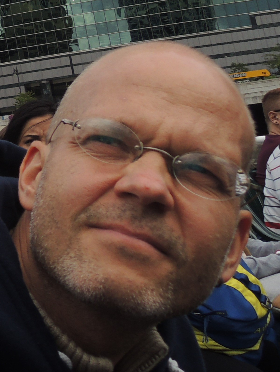Dominik Weiss
ECG Bulletin January 2020
Dominik Weiss is Professor for Environmental Geochemistry at Imperial College. His main research interests centre around trace metals in natural and man-made environments and, in particular, non-traditional stable isotopes and solution and surface processes.
What inspired you to become a scientist?
From early on, I was inspired by the work my father did as a synthetic organic chemist for a major
pharmaceutical company, and by spending time outdoors with my family and friends. I was always
interested in knowing how the physical world around me works – why is the sun emitting light, how does photosynthesis work, what about electricity? But, equally, I was motivated and drawn into science by serious threats to the environment. When I was young, it was the acid rain challenge. Today it is climate change.
What inspired you to become a scientist?
From early on, I was inspired by the work my father did as a synthetic organic chemist for a major
pharmaceutical company, and by spending time outdoors with my family and friends. I was always
interested in knowing how the physical world around me works – why is the sun emitting light, how does photosynthesis work, what about electricity? But, equally, I was motivated and drawn into science by serious threats to the environment. When I was young, it was the acid rain challenge. Today it is climate change.
|
How did you come to specialise in geochemistry?
I was interested in all aspects of science, so read natural sciences at the ETH Zurich. I had lectures with Walter Stumm – the author of the classic textbook Aquatic Chemistry – and this brought me into Environmental Chemistry. During my degree I spent much time mountaineering and was very interested in international development, so felt that specialising in soil chemistry and analytical chemistry would enable me to combine interests in fundamental science with my passion for outdoor and ‘meaningful’ work. I did my Master’s thesis in soil chemistry and then was attracted to learn about isotopes and mass spectrometry through my PhD project. That led me into geochemistry. |
Could you describe your current job?
I conduct active research (with a group of five PhD students and two fellows), teach at undergraduate level, do the usual departmental admin, and fundraise. Our group works experimentally and theoretically. We have an experimental and analytical lab and various computer programs and high-performance computing faculties.
What advice would you give to anyone considering a career in environmental chemistry?
For a career in academia, it is important to be led by real curiosity and interest. I would strongly recommend they read a lot and get solid advice from a mentor: a person who you look up to scientifically, but also on a personal level, enabling you to ask important questions and obtain guidance on the tricky politics of science.
What are some of the challenges facing the environmental chemistry community?
Like everywhere in science, it is the perceived need to be applied, practical, and meaningful. This threatens research that is fundamental and basic. So often I am asked what the implications of my work are for the society. Trying to understand a process is not enough. Planted trees will only be strong if we understand the underlying mechanisms.
What is the most rewarding aspect of your career so far?
Collaborating with smart, enthusiastic, witty colleagues and students. I cannot tell you how happy this makes me. Then I think of the special feeling of discovery, learning new things, of publishing the research and seeing how people pick it up and how our findings make it into a text book, into a patent, into an app., into a software program, or into a policy document. I also love teaching and stretching young scientists with imagination in maths and chemistry.
If you weren’t a scientist what would you do?
I would love to be a carpenter, a mountaineering guide, a forest worker, a fisherman, cycling around the world, or a nurse, or a doctor. Oh and astronaut too; maybe even a politician.
And what do you do when you are not working?
Spending time with my family. I have the most wonderful wife and daughter – who is only four, so still needs lots of time. Most of what I love we can do together – cycling, travelling, playing music, reading and having friends and family over for a pint or a bulgogi. When I have me time, then I swim and do karate regularly to balance my desktop and brain-working life.
I conduct active research (with a group of five PhD students and two fellows), teach at undergraduate level, do the usual departmental admin, and fundraise. Our group works experimentally and theoretically. We have an experimental and analytical lab and various computer programs and high-performance computing faculties.
What advice would you give to anyone considering a career in environmental chemistry?
For a career in academia, it is important to be led by real curiosity and interest. I would strongly recommend they read a lot and get solid advice from a mentor: a person who you look up to scientifically, but also on a personal level, enabling you to ask important questions and obtain guidance on the tricky politics of science.
What are some of the challenges facing the environmental chemistry community?
Like everywhere in science, it is the perceived need to be applied, practical, and meaningful. This threatens research that is fundamental and basic. So often I am asked what the implications of my work are for the society. Trying to understand a process is not enough. Planted trees will only be strong if we understand the underlying mechanisms.
What is the most rewarding aspect of your career so far?
Collaborating with smart, enthusiastic, witty colleagues and students. I cannot tell you how happy this makes me. Then I think of the special feeling of discovery, learning new things, of publishing the research and seeing how people pick it up and how our findings make it into a text book, into a patent, into an app., into a software program, or into a policy document. I also love teaching and stretching young scientists with imagination in maths and chemistry.
If you weren’t a scientist what would you do?
I would love to be a carpenter, a mountaineering guide, a forest worker, a fisherman, cycling around the world, or a nurse, or a doctor. Oh and astronaut too; maybe even a politician.
And what do you do when you are not working?
Spending time with my family. I have the most wonderful wife and daughter – who is only four, so still needs lots of time. Most of what I love we can do together – cycling, travelling, playing music, reading and having friends and family over for a pint or a bulgogi. When I have me time, then I swim and do karate regularly to balance my desktop and brain-working life.


